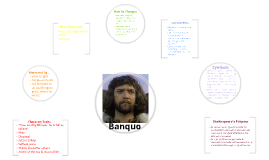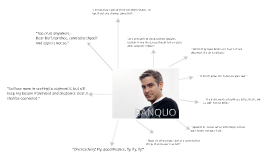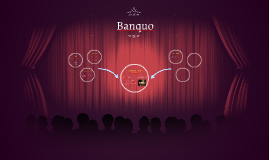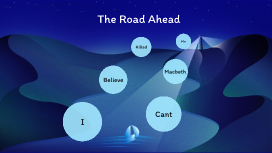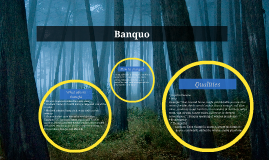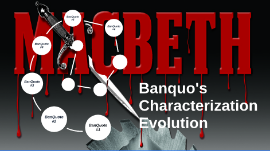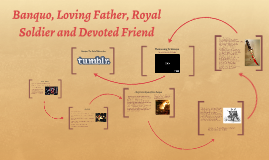Banquo
Transcript: "Lesser than Macbeth, and greater' Not so happy, yet much happier' Thou shalt get kings, though thou be none." The first witches' prediction is common use of the ambiguous language that the witches use, their words ring like a paradox, an equivocation but close analysis of later events proves the truth of the predictions Macbeth becomes king and therefore Banquo becomes his subject - he is "lesser" than Macbeth. Unlike Macbeth who, through his tyranny and ruthless blood-thirst, loses the support and respect of those who were once close to him, Banquo retains his integrity and the respect of all who know him, even though Banquo dies, his memory is that of a noble and loyal gentleman, whereas Macbeth is despised. In this sense, then, Banquo is "greater" than Macbeth. The second witch says that Banquo would be "not so happy, yet much happier". Once again, paradox is used. Banquo would obviously not be happy for the death of his king (Duncan) saddens him later, whilst for Macbeth it brings the crown. Macbeth feels no remorse. Secondly Macbeth has Banquo assassinated, so Banquo is therefore once again, "not so happy". What does make Banquo "much happier" or more fortunate than Macbeth is the fact that in death, he is at peace whilst Macbeth cannot sleep. He becomes steeped in blood and is paranoid, suspecting practically all those around him. He is haunted by the murders of Duncan and Banquo and can therefore not enjoy a peaceful rest. The third witch's prediction "Thou shalt get kings, though thou be none" affirms the fact that although Banquo would not be a king himself, his heirs would. His issue would become either be rulers themselves or would be the progenitors of future kings. Macbeth considers them both threats, but Banquo is compared to the "grown serpent" and the "worm" or immature snake, is Fleance. Macbeth recognizes that even though Fleance has no power right now, he has the capability of power in the near future, and is still a threat. Calling Banquo a serpent can be considered ironic, as serpents are usually considered creatures of evil and chaos, whereas throughout the play, Banquo is held in high regard, "in his royalty of nature/He hath a wisdom that doth guide his valour".(Act 3, Scene 1 51-54) Macbeth asks, "Which of you have done this?" addressing the lords and guests at the feast. Lennox has just tried to show Macbeth to his seat, only Macbeth cannot see that a seat is empty. Instead, he sees the ghosty visage of Banquo. The seat that Banquo occupies, the seat of Macbeth , a supernatural element,foreshadowing ill omens and Macbeth's eventual downfall, because even though Banquo will never be king, that seat will belong to his children. In many ways, Banquo can be seen as the mirror image of Macbeth.Yes,early on they are indeed similar:both are brave warriors;good friends;both are promsied similar things by the witches;both are honored by the king. Where they differ serves to define each man in his own right:where Banquo has a son,Macbeth has a wife; where Banquo is rather indifferent to the witches' prophecies,Macbeth's obsessed. By Act 2, these differences in the two men will lead to Macbeth killing Duncan, and in Act Three the murder of Banquo and attempted murder of his son,Fleance. After Banquo is murdered,he returns as a ghost, a harbinger of bad luck. In the banquet scene, he returns to haunt Macbeth and serves as a supernatural symbol of retribution in the play causing Macbeth to feel guilt and mental illness The Importance of Banquo The Meeting of the Witches The Royal Palace When meeting with the witches, both Banquo and Macbeth receive 3 prophecies where Macbeth receives prophecies of his rise to power , while Banquo receives prophecies of his children rising to power which inadvertently put both Banquo and Fleance in danger. The time has been That, when the brains were out, the man would die, And there an end. But now they rise again... Dreading the Ghost Inversion of Natural Order In Act 3, Scene 4, Macbeth learns of the death of Banquo but and that Fleance has escaped. The news of Fleance’s escape angers Macbeth—if only Fleance had died, he muses, his throne would have been secure. Returning to his guests, Macbeth goes to sit at the head of the royal table but finds Banquo’s ghost sitting in his chair. Horror-struck, Macbeth speaks to the ghost, which is invisible to the rest of the company. Avaunt, and quit my sight! Let the earth hide thee. Thy bones are marrowless, thy blood is cold. The Entrance of The Ghost Banquo There the grown serpent lies; the worm that's fled Hath nature that in time will venom breed, Marrowless/blood is cold-no life, horrific , that which is dead is living






